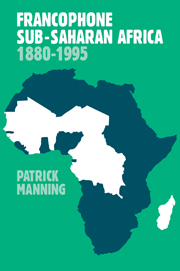Book contents
- Frontmatter
- Contents
- List of illustrations
- Acknowledgments
- Note on the second edition
- Map 1 Francophone sub-Saharan Africa in 1995
- 1 Prologue
- 2 Economy and society, 1880–1940
- 3 Government and politics, 1880–1940
- 4 Culture and religion, 1880–1940
- 5 Economy and society, 1940–1985
- 6 Government and politics, 1940–1985
- 7 Culture and religion, 1940–1985
- 8 Democracy and dependence, 1985–1995
- 9 Epilogue
- Bibliographical essay
- Index
2 - Economy and society, 1880–1940
Published online by Cambridge University Press: 12 January 2010
- Frontmatter
- Contents
- List of illustrations
- Acknowledgments
- Note on the second edition
- Map 1 Francophone sub-Saharan Africa in 1995
- 1 Prologue
- 2 Economy and society, 1880–1940
- 3 Government and politics, 1880–1940
- 4 Culture and religion, 1880–1940
- 5 Economy and society, 1940–1985
- 6 Government and politics, 1940–1985
- 7 Culture and religion, 1940–1985
- 8 Democracy and dependence, 1985–1995
- 9 Epilogue
- Bibliographical essay
- Index
Summary
The European conquerors of Africa believed that Africa changed only by fits and starts, and only as a result of external stimulus. These colonizers believed themselves to be developing a backward continent. They thought their new colonial regime was imposing great changes from outside, suddenly and powerfully, on a continent which was previously static, stagnant, and isolated. These Europeans chose to see themselves as the cause of positive change, and saw Africans as the cause of backwardness.
Some colonizers saw themselves as saviors of their fellow humans in Africa. They offered spiritual salvation through Christianity, or social salvation through Western eduction and capitalist enterprise. Other Europeans saw themselves as superior beings. They passed judgment on African civilization and found it to be morally inferior, economically backward, and incapable of achieving equality with Western civilization. Most Europeans in the late nineteenth century spoke of Africans as children – and therefore as people without maturity and without history. Not all Europeans considered that Africans were capable of growing up.
While Africans rarely spoke of themselves as children, many Africans did accept an apocalyptic view of colonialism. Certain of them accepted colonialism enthusiastically in hopes that it would create a new Africa more to their liking. Such a person was Joseph Tovalou Quénum, the wealthy Dahomean merchant and political figure who sought to expand his family fortune by allying with the French against his king, Behanzin.
- Type
- Chapter
- Information
- Francophone Sub-Saharan Africa 1880–1995 , pp. 24 - 56Publisher: Cambridge University PressPrint publication year: 1999



